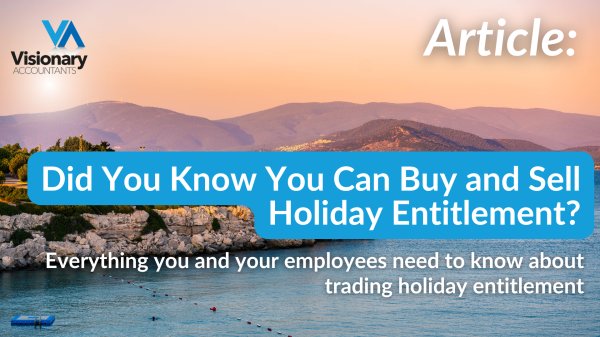What are Annual Leave Purchase Schemes?
Annual leave purchase schemes can be a good incentive allowing employees to increase existing holiday entitlement as provided for in the employment contract. Such schemes are offered as part of a wider sweep of flexible benefits and enable staff to increase annual leave entitlement or sell excess leave via a salary sacrifice arrangement.
So, what do employers need to consider?
Although operated under a salary sacrifice arrangement, these types of flexible benefits are considered intangible benefits that are not impacted by the changes in the treatment of salary sacrifice schemes introduced in April 2017, in the form of Optional Renumeration Arrangements (OpRA).
When employees choose to buy additional leave, their gross pay is reduced for tax and NIC purposes but equally, if selling extra leave this will increase gross pay for tax and NIC.
Identifying potential risks
The main risks to be aware of are:
- Breaching Statutory minimum annual leave entitlement
- Contradicting Company Policy or breaching employment contracts
- National Minimum Wage non-compliance
It is vital that employers ensure employees cannot sell leave which would reduce their annual entitlement to below the statutory minimum 5.6 weeks, capped at 28 days for full-time workers, or pro-rated for part-time workers.
Calculating extra leave should be in line with company policy. For full-time employees an amount that is equivalent to their normal regular pay. And for part-time workers this would be the equivalent of their pro-rated leave as expressed in days or hours.
Purchasing extra leave can lead to non-compliance issues in respective of the National Minimum Wage (NMW). Employers will be in breach of the rules if the employee’s pay falls below the set rates. Checks should be put in place to monitor this.
How to manage the process
Before agreeing to the purchase of extra leave you must assess the employees’ earnings in the relevant pay reference period to ensure it does not fall below the necessary limits in force as this is unlawful.
Given that these are voluntary schemes, where there is a potential NMW breach, discuss alternative options; such as a reduction in the number of days being requested. However, if the extra leave cannot be accommodated due to the level of basic earnings being at or near the NMW the request can be declined.
Remember, the legal position in the UK as regards annual leave provides for workers to receive a minimum amount of annual leave to ensure a period of rest and relaxation away from their place of work, therefore anything above this is a benefit for the employee.
When handling terminations, rules relating to the recovery of overtaken annual leave must be stipulated in the contract of employment or under a separate agreement.
Problems can arise for employers when determining the recovery amount so you should ensure that statutory leave entitlement is monitored as this should be the first consideration when assessing basic entitlement and whether any holiday entitlement has been exceeded.
Extra leave that is purchased is entirely a matter for the employee to consider and manage, so if for some unknown reason the employee has not taken the extra leave acquired employers will need to address such issues as they arise.
Review your scheme periodically and update company policy to maintain the correct control levels continue to assess any risk areas and communicate any changes to line managers so that they can also ensure there is a clear directive across the business.
The Festive Incentive
In St Albans, where small businesses are the backbone of the local economy, attracting and retaining talent is crucial. During the holiday season, offering unique incentives like an Annual Leave Purchase Scheme can be a game-changer. This scheme allows employees to voluntarily "buy" additional paid holidays on top of their regular entitlement, injecting a dose of holiday cheer and boosting employee morale.
By implementing a well-structured Annual Leave Purchase Scheme, St Albans' small businesses can also tap into the festive spirit, boost employee morale, and solidify their position as desirable employers. The financial figures are just a starting point, and businesses can tailor the scheme to their specific needs and budget. Ultimately, the gift of additional time off can be a valuable investment in both employee happiness and business success. However, as an employer, if you are concerned or unsure about aspects of your scheme, seek legal advice to assist with drafting clear policies.
Financial Figures
To illustrate the potential financial impact of the Annual Leave Purchase Scheme, let's consider an example:
Assuming an employee’s annual salary is £30,000 and they are entitled to 20 days of annual leave:
- Daily Rate: £30,000 / 260 working days = £115.38 per day
- Cost of Purchasing Additional Leave: £115.38 * 5 days = £576.92
In this example, for an investment of £576.92, the employee can purchase an additional 5 days of leave, providing them with extended time off.
The HMRC website doesn’t explain the specifics of Holiday Purchase Schemes, therefore advice is essential.
Contact Tena Wallace, HR & Payroll Director at Visionary Accountants, St Albans if you have any questions about Holiday Purchase Schemes.
